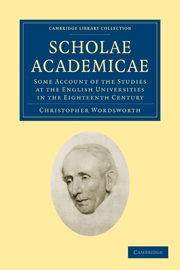 Scholae Academicae
Scholae Academicae Book contents
- Frontmatter
- PREFACE
- Contents
- CHAPTER I GENERAL INTRODUCTION
- CHAPTER II THE TRIPOS, name and thing
- CHAPTER III THE SOPHS' SCHOOLS before 1765
- CHAPTER IV ACTS AND OPPONENCIES after 1772
- CHAPTER V THE SENATE-HOUSE
- CHAPTER VI THE ADMISSION OF QUESTIONISTS. Huddling
- CHAPTER VII THE MATHEMATICKS
- CHAPTER VIII THE TRIVIAL ARTS
- CHAPTER IX HUMANITY
- CHAPTER X MORALS AND CASUISTRY
- CHAPTER XI LAW
- CHAPTER XII MODERN STUDIES
- CHAPTER XIII ORIENTAL STUDIES
- CHAPTER XIV PHYSICK
- CHAPTER XV ANATOMY
- CHAPTER XVI CHEMISTRY
- CHAPTER XVII GEOLOGY AND MINERALOGY
- CHAPTER XVIII BOTANY
- CHAPTER XIX The Degree of M.A.
- CHAPTER XX MUSICK
- CHAPTER XXI ASTRONOMY
- CHAPTER XXII CONCLUSION
- APPENDICES
- INDEX
CHAPTER III - THE SOPHS' SCHOOLS before 1765
Published online by Cambridge University Press: 07 September 2010
- Frontmatter
- PREFACE
- Contents
- CHAPTER I GENERAL INTRODUCTION
- CHAPTER II THE TRIPOS, name and thing
- CHAPTER III THE SOPHS' SCHOOLS before 1765
- CHAPTER IV ACTS AND OPPONENCIES after 1772
- CHAPTER V THE SENATE-HOUSE
- CHAPTER VI THE ADMISSION OF QUESTIONISTS. Huddling
- CHAPTER VII THE MATHEMATICKS
- CHAPTER VIII THE TRIVIAL ARTS
- CHAPTER IX HUMANITY
- CHAPTER X MORALS AND CASUISTRY
- CHAPTER XI LAW
- CHAPTER XII MODERN STUDIES
- CHAPTER XIII ORIENTAL STUDIES
- CHAPTER XIV PHYSICK
- CHAPTER XV ANATOMY
- CHAPTER XVI CHEMISTRY
- CHAPTER XVII GEOLOGY AND MINERALOGY
- CHAPTER XVIII BOTANY
- CHAPTER XIX The Degree of M.A.
- CHAPTER XX MUSICK
- CHAPTER XXI ASTRONOMY
- CHAPTER XXII CONCLUSION
- APPENDICES
- INDEX
Summary
‘Bona noua, Mater Academia, bona noua.’
Bedell Buck's Book (1665).In the sixteenth and seventeenth centuries many students may have got their first degree in Arts with little examination or none at all. Each was called upon to answer one question in ‘Aristotle's Priorums’ and to be able to walk through the Respondent's Stall! In 1555 and 1665 we read of all candidates being required to keep the Lenten exercise of ‘sitting in xlmâ’ (quadragesima), which ceremony is also described in D'Ewes' diary (1619), p. 67. ‘It was the custom for the Bachelor commencers to sit in the Schools during the whole of Lent, “except they bought it out,” and to defend themselves against all opponents.’ But it must have depended entirely upon the Regents whether any student was called upon to dispute; and the arguguments and questions which were uttered seem to have been often frivolous and undignified. At Oxford the proceeding seems to have been conducted in a still more unseemly manner. Just before Laud's cancellariate a number of ‘necessary regents’ in addition to the ‘masters of the schools’ had to be called in to aid the proctors in quelling the fights and in checking the potations and lounging which disgraced the schools of that university.
- Type
- Chapter
- Information
- Scholae AcademicaeSome Account of the Studies at the English Universities in the Eighteenth Century, pp. 22 - 31Publisher: Cambridge University PressPrint publication year: 2009First published in: 1877


